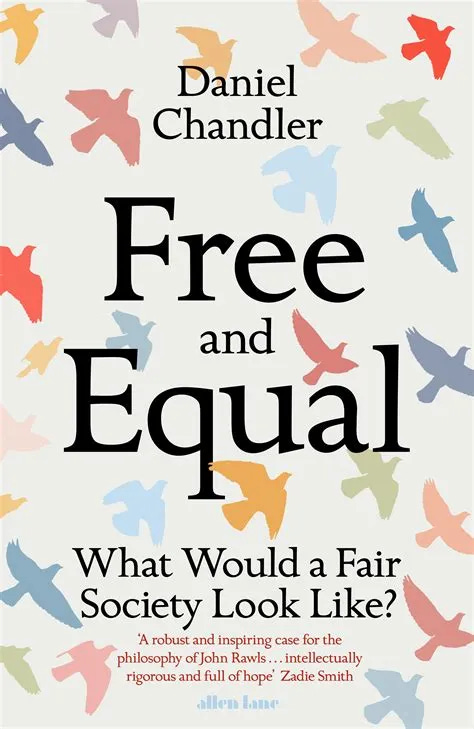Reimaging Freedom and Justice in the 21st Century
Reading: Free and Equal by Daniel Chandler
I read John Rawls’s A Theory of Justice (1971) a long time ago. Back then, I found his ideas particularly compelling, but in a purely theoretical framework and not applicable to real life. It may have been because I was too young and ignorant or because the timing was wrong. It was, I think, shortly after the fall of the Berlin Wall, a time when hope and optimism were in the air.
Of course, now I (we) know better. Nearly three and a half decades since the Berlin Wall's collapse, our understanding has profoundly evolved, and the hopes of 1989 for a better world have not materialised. Instead, we find ourselves navigating a global landscape rife with complexities and uncertainties, a stark contrast to the optimistic visions once held.
The COVID-19 pandemic has disrupted livelihoods and health systems globally, while the escalating climate crisis has led to more frequent natural disasters, biodiversity loss, and human displacement. Geopolitical tensions and conflicts continue to impact people's lives, affecting trade, security, and access to essential resources. Moreover, growing inequality and poverty, exacerbated by neoliberal policies, have left many people vulnerable to shocks and risks and have catalysed significant political upheavals, including the UK's decision to exit the European Union (Brexit), the election of Donald Trump as President of the United States, and the emergence of illiberal/authoritarian regimes across the globe. Additionally, these conditions have fuelled divisive cultural conflicts, further fragmenting societies and undermining the fabric of democratic principles.
Our institutions are failing us. Yet, the philosophical insights of John Rawls might offer the essential solutions required in our contemporary context, particularly amidst the crises confronting liberal democracy and global challenges like climate change and pervasive inequality. Could Rawls's principles provide us with a vision of what a just and fair society looks like?
Yes, argues Daniel Chandler, and he embarks on an intellectual journey, weaving together the philosophical concepts of John Rawls with the critical challenges of the modern era. In his insightful and stimulating book ‘Free and Equal’, Chandler reexamines Rawls's vision of a just society, critically examining them through the prism of today’s issues, like climate change, global inequality, and the erosion of liberal democracy. He then outlines a pathway towards actualizing a society where the principles of freedom and equality transcend theoretical aspirations to become tangible realities.
Rawls proposed a powerful and intuitive thought experiment, which he called the ‘original position’, in order to answer this question. If we want to know what a fair society would look like, he argued, we should ask ourselves how we would choose to organise it if we didn’t know what our individual circumstances would be, as it behind a 'veil of ignorance’.
From this perspective, we can make impartial decisions about the organization of society. Chandler emphasizes the importance of protecting basic liberties, including freedom of expression, association, and personal property, as well as political liberty, encompassing the right to vote, run for office, and access a fair and just legal system.
Chandler draws upon historical examples, philosophical insights, and contemporary issues to illustrate the interconnectedness of human rights, equality, and freedom. Based on Rawls’s notion of 'state’, he argues for a holistic approach to social justice, where the role of the state extends beyond enforcing contracts to creating conditions that uphold freedom and equality.
This egalitarian perspective sets Rawls apart from right-wing thinkers who prioritize voluntary contracts. And yet his theory has often been regarded with scepticism on the left too, especially by those who see private ownership as inherently unjust. Rawls rejected the idea that private ownership of firms and raw materials is inherently unjust and argued that the problem with capitalism as we know it is not the existence of private property, but the fact that ownership is so heavily concentrated in the hands of a wealthy elite. He proposes a pragmatic approach, advocating for a "property-owning democracy" that combines private ownership with wider distribution, rather than concentrating wealth and power in the hands of a privileged few.
Chandler's analysis extends beyond theoretical exploration, offering concrete strategies to address global problems and create a more just society. These strategies include safeguarding basic freedoms, securing fair equality of opportunity, and ensuring fair economic structures. He emphasizes the need to reduce the influence of money in political decision-making processes and encourage dialogue and understanding to move beyond divisive culture wars. Finally, Chandler underscores the importance of operating within planetary limits, highlighting the duty to preserve a stable climate and vital ecosystems for the well-being of current and future generations. Whatever we do to increase prosperity and raise the living standards of the least well-off must be consistent with this basic commitment to social and environmental stewardship.
While Chandler's proposals present a compelling vision for a just and equal society, their realization is not guaranteed. In fact, the very survival of liberal democracy itself is uncertain. However, this should not lead to pessimism or despair. Instead, it serves as a reminder that we have the power to shape our world for better or worse. Free and Equal, offers us a new way of thinking about politics and justice. But it’s up to each of us, both individually and collectively to build a society in which we all are, free and equal.
Join the subscriber’s chat if you want to start or join a conversation. Threads are a quieter space where readers can have a real, in-depth talk with me and others about books, art and life in general. All welcome- except trolls.






